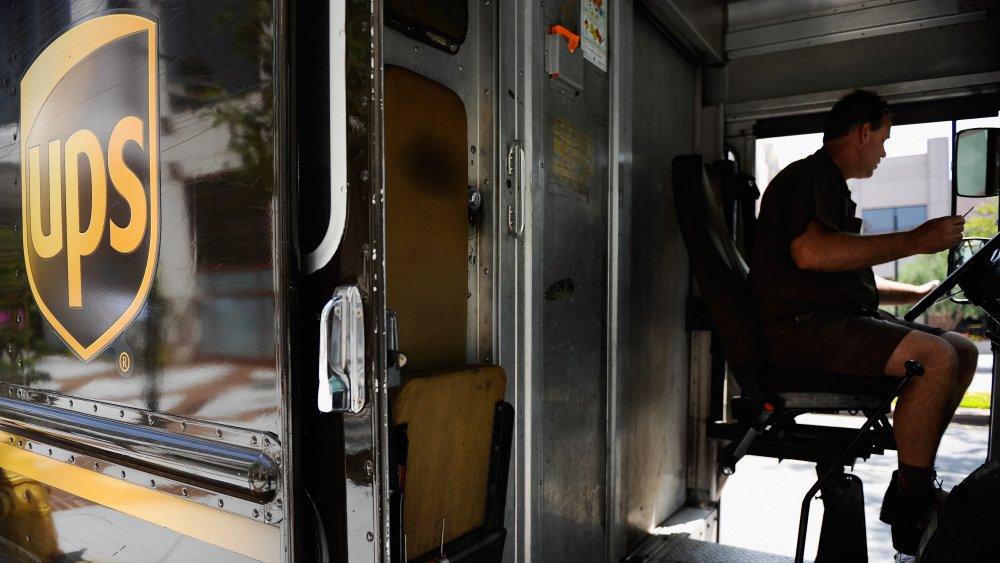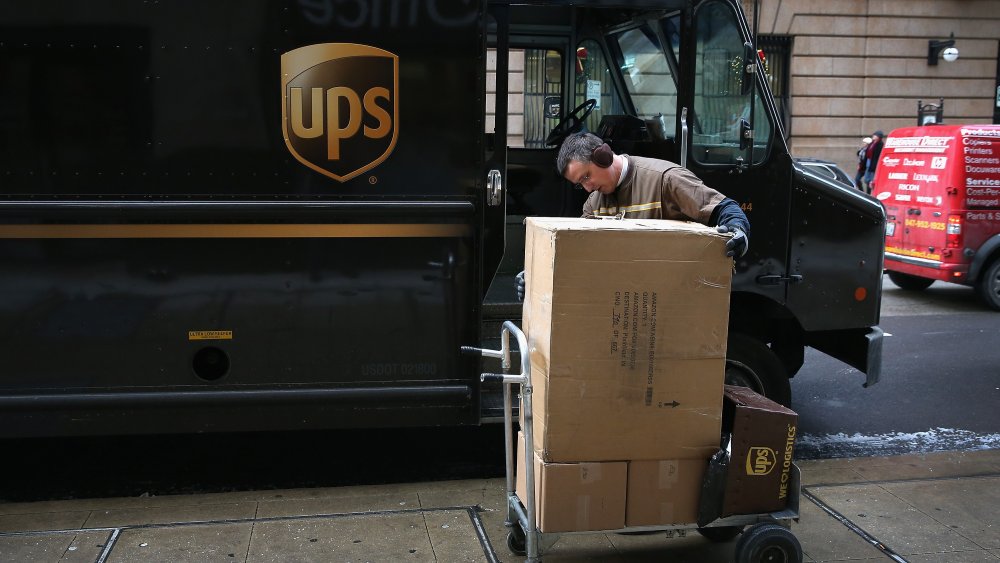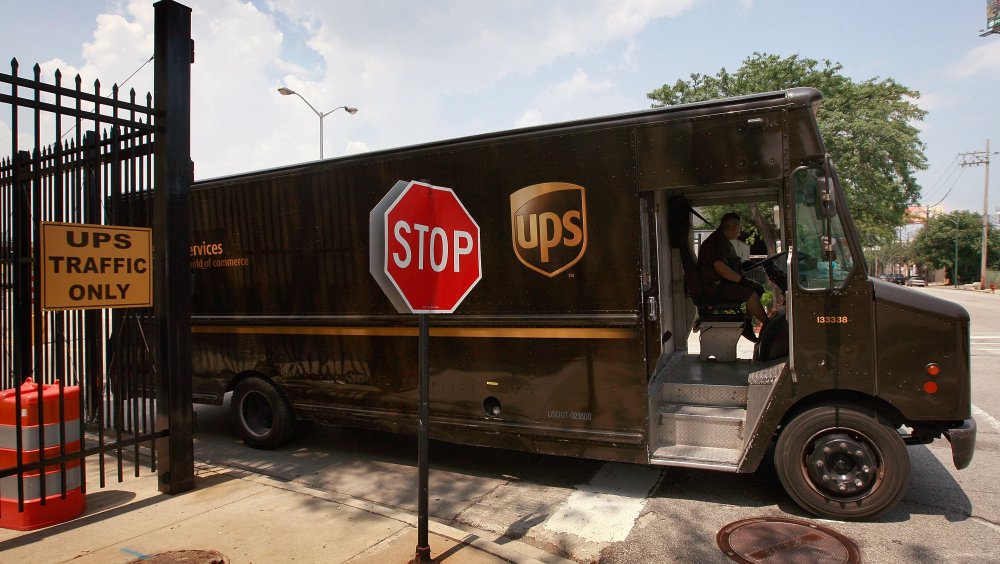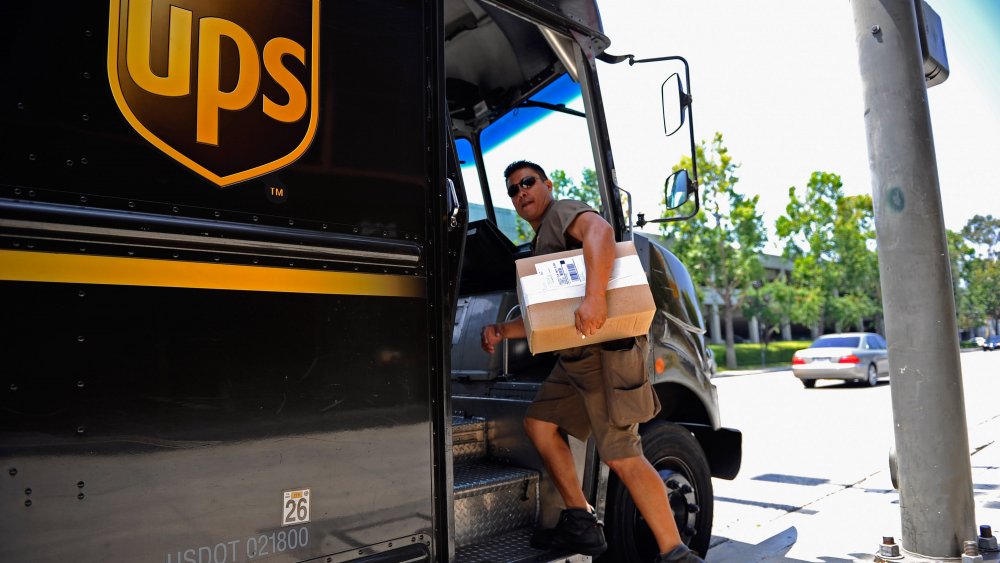The Reason UPS Trucks Always Have Their Doors Open
In 2010, UPS ditched its iconic slogan, "What can brown do for you?" in favor of the more efficiency-oriented "We (heart) logistics." In 2015, the company cut the heart out of the equation, no longer professing its love for logistics and instead adopting the motto, "United Problem Solvers." While the latter two slogans sound less friendly, you could argue that they better reflect one of the unifying philosophies of the United Parcel Service: time is money, and UPS is all about saving both.
Time is a truckload of money for UPS
In 2014, UPS employee Jack Levis explained to NPR, "Just one minute per driver per day over the course of a year adds up to $14.5 million." The pressure to shave off minutes from deliveries is increased by the the mind-numbing number of delivers UPS makes. For instance, according to the Chicago Tribune, in 2017 the company was slated to deliver 750 million packages worldwide between Thanksgiving and Christmas alone. To ensure the fastest deliveries humanly (and perhaps super-humanly) possible, UPS equips its trucks with sensors that track every movement a driver makes, allowing the company to discover what brown can do for itself to save time and money.
When the company discovered that using a key to open doors was eating up precious seconds, keys were replaced with push-button key fobs. Drivers avoid making left turns to save time and fuel. According to the Atlanta Journal-Constitution, trucks aren't air-conditioned because the average UPS delivery person opens their cargo bay doors 130 times a day. Similarly, during deliveries, drivers leave the passenger door open in order to make leaving the vehicle more efficient. Moreover, as one driver told the Bristol Herald Courier, in lieu of air conditioning, drivers have fans to cool themselves, so leaving the door open seems like a must in summer months.
What brown won't do for drivers
Considering how often truck doors are open during deliveries, it makes financial sense not to equip delivery vehicles with air conditioning. But that reasoning seems to assume that drivers won't need to stop mid-delivery to cool off on those ugly summer days when the sun seems determined to boil you alive. NBC reports that "UPS drivers have recorded temperatures as high as 152 degrees," and as Live Science notes, hyperthermia sets in for most people after about 10 minutes in "extremely humid," 140-degree heat. So while UPS's candy-bar-colored trucks won't melt, the humans steering them probably feel like they're drowning in hot chocolate when Mother Nature cranks up the heat.
In August 2016, 59-year-old James Klenk suffered heat stroke and kidney failure after several consecutive days working in his stiflingly hot truck. In 2018, Klenk's wife started an online petition demanding that UPS provide air-conditioned trucks for its drivers. The company expressed appreciation for its drivers' efforts but noted that "working outdoors throughout the year is the nature of the job." UPS only keeps a small fleet of air-conditioned trucks for trips that cross the California desert. That's probably no consolation during days when everywhere feels like a flaming Sahara.
According to NBC, July 2019 "was officially the hottest month on record," and various medical records and interviews showed that "UPS workers have convulsed, fainted and landed in the emergency room with heat-induced kidney failure" in those scorching conditions. Sixteen delivery people told NBC that they suffered from heat-related illnesses. But hey, that's just the nature of the job, right?
United People Surveillance
UPS is a well-oiled machine, and as the cogs behind the wheel, drivers are expected to be as efficient as mechanically possible. The obvious problem with treating people like machine parts is that they aren't hardwired to function like robots. Humans overheat more easily. They need time to refuel with food and time to poop out the fuel their bodies can't use. But in 2015, an anonymous UPS driver identified as "Bill" told the Nation that something as natural as using the bathroom was considered "stealing time" from the company. (And if UPS considers pooping a form of time theft, then hand-washing after you poop must count as stealing time and soap.)
Bathroom visits weren't the only kind of waste the company frowned upon. Bill recalled, "If you turned the truck on before you put on your seat belt, that's wasting gas." Truck sensors recorded when his foot was on the brake, how far he backed up — everything. And UPS isn't alone in monitoring every millisecond of an employee's day. In 2013, FedEx warehouse employee Reynalda Cruz suffered inflammation in her arm because of a scanner that tracked her every movement, and when she slowed down because of the pain, she was ordered to speed up. Similarly, Amazon automatically tracks warehouse workers and fires them for not meeting productivity quotas, according to the Verge. Unfortunately, when companies obsess over cutting costs, workers often end up paying a high price.



